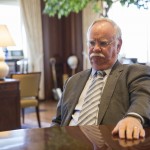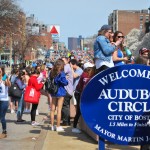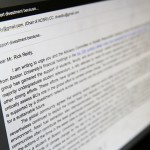[mediagrid cat=”17343″]
Hundreds of demonstrators walked from the Old State House to the African Meeting House Monday as part of the 4-Mile March, which advocates for an end to police brutality and mass incarceration, in honor of Martin Luther King, Jr. Day.
Organized by MLK Day Action Boston, the 4-Mile March was part of a larger movement of marches that took place in cities across the United States and in Montreal Monday. Approximately 1,800 people clicked “attending” on the Facebook event for Boston’s 4-Mile March.
The name of the march refers to the four-and-a-half hours Michael Brown, an unarmed black teenager, lay in the street of Ferguson, Missouri after a police officer shot him August 2014 and the four minutes Tamir Rice, a 12-year-old black boy lay waiting on the .
Brandi Artez, one of the leaders of the Boston march and a member of MLK Day Action Boston, said the 4-Mile March had a multi-faceted significance.
“Aside from symbolizing Michael Brown, the length also symbolizes the four minutes Tamir Rice was left on the street of Ohio before he was given any type of medical attention,” she said.
Mahyrah Shamseddine, another organizer of the Boston march, said the march highlights Martin Luther King, Jr.’s drive to fight for what he believed in.
“We see this movement to fulfill some of Martin Luther King, Jr.’s dreams and honor his legacy of revolution,” she said.
Gathering at the Old State House, organizers handed out with fliers with chants and march routes to the attendees and shared the seven demands they had prepared for the state.
The demands included sufficient punishment for law-breaking police officers, justice for Massachusetts families affected by police brutality, an end to mass incarceration and the defunding of prisons and funding of low-income communities. Additionally, they called for raising the minimum wage to $15 per hour, the rejection of the 2024 Boston Olympics bid and a stop to U.S. imperialism and international conflict.
Brock Satter, one of the organizers of the march, said the seven demands resulted from a variety of discussions, where people voiced their concerns and prioritized their goals.
“The important thing is that we do have demands. We’re not standing out here protesting for the sake of protest,” he said. “People want to see some changes going on.”
Shamseddine said some of the demands, which were voted on by a pool of 100 people, affect the entire nation, while others specifically affect the Boston community.
Artez recited an excerpt from King’s famous “Letter From Birmingham Jail” to energize the crowd.
Demonstrators chanted loudly and enthusiastically, waving signs and banners that addressed their rights to a democracy, the fight for police brutality victims and demands for peace, justice and police reform.
The demonstrators also took part in two communal “die-ins.” The first was in front of Boston Common, halfway through the march, and the other was moments before the rally ended in front of the Massachusetts State House, minutes from the African Meeting House.
The march ended on the stairs of the Massachusetts State House and moved on to the closing rally. Organizers gave closing speeches and information about future direct action the organization could take.
Several attendees said they participated in the march to honor those affected by police brutality and violence and fight for equal treatment.
Kasey Ochiltree, 30, of Back Bay, said police brutality is not the only place people can find inequality in the Boston community.
“There’s a huge unjust system that starts from poverty up, not just the police,” she said. “There are a lot of issues and also police brutality because there is an abusive power there. So I came out to show my solidarity to those who have been exposed to that power struggle.”
Julia Brown, 33, of Jamaica Plain, said the 4-Mile March should be one piece in a range of strategies to fight for equality.
“This is certainly a starting point, and I hope for more visibility from people who aren’t here to attend,” she said. “I hope they will be motivated to think twice about their privileges.”
Jose Aravena, 41, of Dorchester, said the number of people who attended signifies the growing injustice.
“I’m happy to see many people participate … It is a great reflection of the ongoing conflict,” he said. “I hope more people will join in the fight.”




